Miniature Schnauzer Dog Overview
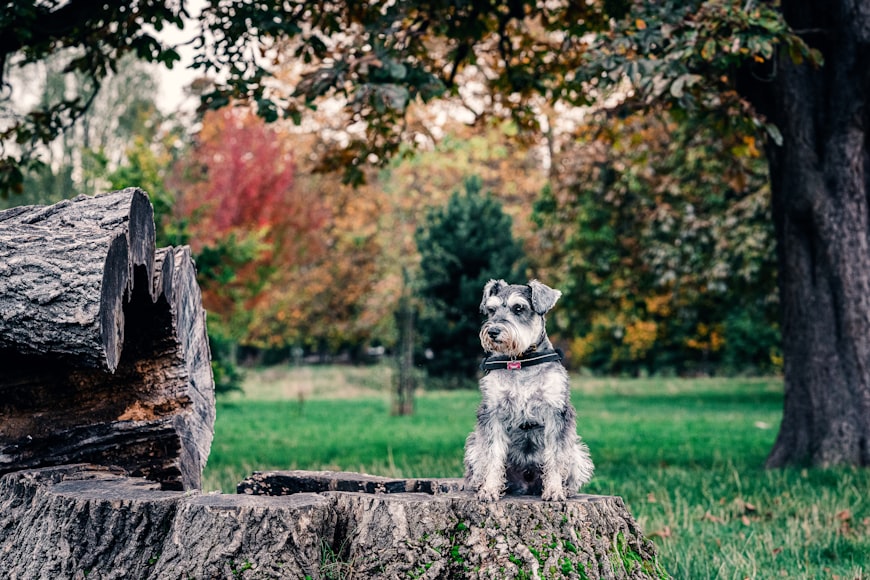
Introduction
The Miniature Schnauzer, a beloved canine companion renowned for its intelligence, loyalty, and unwavering spirit, has captured the hearts of dog enthusiasts worldwide. This small but mighty breed, with its distinctive facial hair and charming personality, makes an exceptional addition to any household.
History and Origin
The Miniature Schnauzer’s lineage can be traced back to the 15th century in Germany, where it was bred as a versatile farm dog. It was not until the late 19th century that breeders selectively bred the breed to a smaller size, resulting in the Miniature Schnauzer we know today.
Physical Characteristics
Miniature Schnauzers are compact and muscular dogs, typically weighing between 11 and 20 pounds and standing between 12 and 14 inches tall. Their distinctive coat comes in three recognized colors: black, salt and pepper, and black and silver. The double coat is hypoallergenic, shedding minimally, making this breed an excellent choice for individuals with allergies.
Personality and Temperament
Miniature Schnauzers are known for their lively and playful personalities. They are highly intelligent, eager to learn, and make exceptional watchdogs. Despite their small size, they possess a fearless and determined spirit. They are also affectionate and loyal, forming strong bonds with their owners.
Activity Level and Exercise
Miniature Schnauzers are energetic dogs that require regular exercise to stay happy and healthy. Daily walks, playtime in the park, or interactive games are essential for their physical and mental well-being. They enjoy activities such as agility, obedience trials, and hiking.
Health and Longevity
Miniature Schnauzers are generally healthy dogs with a life expectancy of 12 to 15 years. However, like all breeds, they may be prone to certain health conditions, including cataracts, bladder stones, and pancreatitis. Regular veterinary checkups and proper nutrition are crucial for their long-term health.
Care and Grooming
Miniature Schnauzers require regular grooming to maintain their distinctive coat. They should be brushed weekly to remove loose hair and prevent mats. Trimming around the eyes, ears, and feet is also necessary. Additionally, their nails need to be trimmed regularly to prevent overgrowth.
Training and Socialization
Miniature Schnauzers are highly trainable and respond well to positive reinforcement. Early socialization is essential to prevent fearfulness or aggression. Exposing them to various people, places, and experiences from a young age will help them become well-rounded and confident companions.
Conclusion
The Miniature Schnauzer is a remarkable breed that combines intelligence, loyalty, and a playful spirit. Their hypoallergenic coat, relatively low maintenance, and suitability for various activities make them an ideal choice for families, individuals, and first-time dog owners alike. With proper care and training, a Miniature Schnauzer will provide years of unconditional love and companionship, becoming an enduring member of your household.
Origin and History
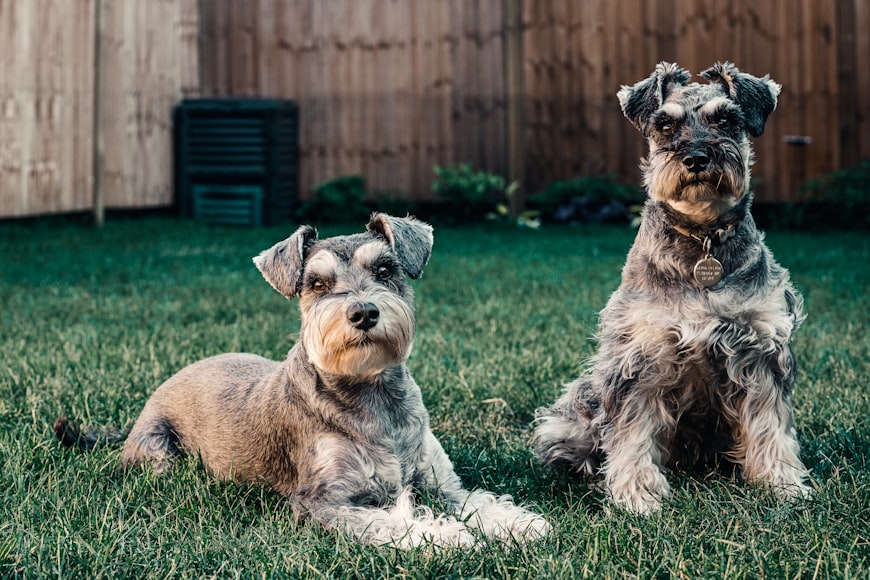
The Miniature Schnauzer, a charming and energetic breed renowned for its intelligence and endearing personality, has a rich history rooted in the rolling hills of Germany. From its humble origins as a working farm dog to its refined elegance as a family companion, the Miniature Schnauzer has evolved into one of the world’s most beloved breeds.
Early Origins: A Farm and Pest Control Ace
The roots of the Miniature Schnauzer can be traced back to the 15th century Germany, where ancestors of the breed—the Standard Schnauzer and the Affenpinscher—were employed on farms and stables to protect livestock and control vermin. The Miniature Schnauzer, however, emerged as a distinct breed in the late 19th century.
The Development of a Distinct Breed
In the 1870s and 1880s, German breeders began selectively crossing Standard Schnauzers with smaller breeds such as the Poodle and Affenpinscher. The goal was to create a smaller version of the Standard Schnauzer that retained its working abilities but would be more suitable for urban living. These early miniature iterations were known as “Zwergschnauzer” (Dwarf Schnauzers).
Refinement and Recognition
By the early 20th century, the Miniature Schnauzer had become a well-established breed in Germany. In 1902, the Pinscher-Schnauzer Club was founded, and the Miniature Schnauzer was officially recognized as a separate breed from the Standard Schnauzer. The breed’s popularity soared, and it was soon exported to other countries around the world.
Introduction to the United States
The Miniature Schnauzer first made its appearance in the United States in the 1920s. It was quickly recognized by the American Kennel Club (AKC) in 1924 and gained popularity as a companion dog. The breed’s intelligence, trainability, and affectionate nature made it a favorite among families and singles alike.
The Breed Standard
The Miniature Schnauzer is a small, sturdy dog with a distinctive appearance. The breed standard dictates a square, well-balanced body with a slightly longer length than height. The head is wedge-shaped, with bushy eyebrows and a prominent mustache. The coat is wiry and comes in three colors: salt and pepper, black, and white.
Versatile and Adaptable
The Miniature Schnauzer’s original purpose as a farm and pest control dog has given way to a wide range of roles in modern society. They excel as companion dogs, therapy dogs, service dogs, and even agility and obedience competition participants. Their intelligence and trainability make them a joy to work with, while their affectionate and playful nature makes them wonderful family pets.
A Beloved Companion
Today, the Miniature Schnauzer remains one of the most popular breeds in the world. They are known for their loving and loyal personalities, their hypoallergenic coats, and their ability to adapt to a variety of lifestyles. Whether you’re looking for an active outdoor companion or a cuddly lapdog, the Miniature Schnauzer is sure to bring joy and fulfillment to your life.
Physical Characteristics
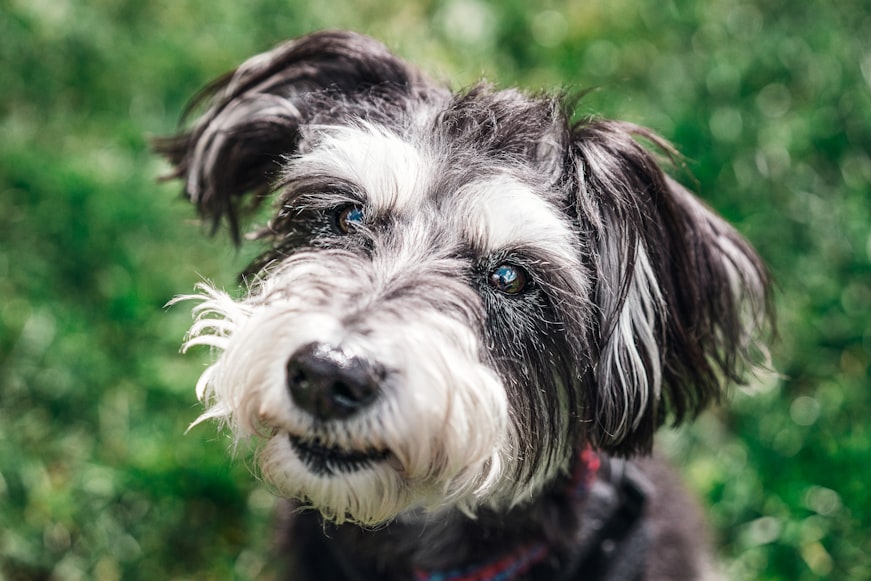
The Miniature Schnauzer is a captivating canine companion known for its compact build, distinctive facial features, and soft yet wiry coat. With its endearing personality and versatile nature, this breed has gained immense popularity among dog enthusiasts. In this article, we delve into the physical characteristics of the Miniature Schnauzer, exploring its unique features that set it apart from other canine breeds.
Compact and Sturdy Build
The Miniature Schnauzer stands out with its compact and sturdy build. These dogs typically weigh between 11 and 20 pounds and measure 12 to 14 inches in height at the shoulder. Their robust frame is supported by strong bones and well-developed muscles, giving them a sturdy and athletic appearance. The Miniature Schnauzer’s compact size makes it an ideal companion for both urban and suburban lifestyles, easily adapting to various living arrangements.
Square-Shaped Head with a Distinct Beard and Mustache
One of the most recognizable features of the Miniature Schnauzer is its square-shaped head, adorned with an array of distinguishing facial characteristics. The breed’s eyebrows are prominent, giving them a keen and expressive look. Their beard and mustache are perhaps their most iconic feature, bestowing upon them a dignified and charming appearance. These facial furnishings are not only aesthetically pleasing but also serve a practical purpose, protecting the dog’s face and eyes from dirt and debris while digging.
Double Coat Consisting of a Wiry Outer Layer and a Soft Undercoat
The Miniature Schnauzer’s coat is a defining characteristic of the breed. It consists of a dense outer layer of wiry hair and a softer undercoat. The outer layer repels dirt and water, providing insulation against the elements. The undercoat, on the other hand, traps air, providing warmth in cold temperatures. This double coat requires regular grooming to maintain its distinctive texture and prevent matting.
Coat Colors and Patterns
Miniature Schnauzers come in a range of coat colors and patterns, including:
- Solid Black: A solid, jet-black coat without any markings.
- Pepper and Salt: A combination of black and white hairs that create a speckled appearance.
- Black and Silver: A black coat with silver highlights, often on the eyebrows, mustache, and legs.
Other Physical Characteristics
In addition to their primary physical characteristics, Miniature Schnauzers possess a number of other notable features:
- Eyes: Their eyes are typically dark brown or black, round in shape, and set wide apart on their face.
- Ears: Miniature Schnauzers have V-shaped ears that are set high on their head. Traditionally, the ears are cropped, but this practice is becoming less common.
- Tail: The tail is typically docked short, leaving a few inches of length.
Conclusion
The Miniature Schnauzer is a captivating canine companion with a unique blend of physical characteristics. Their compact and sturdy build, distinctive square-shaped head with a beard and mustache, and soft yet wiry double coat set them apart from other breeds. Whether you’re an experienced dog owner or a first-time pet parent, the Miniature Schnauzer’s endearing personality and versatile nature will undoubtedly capture your heart. By understanding and appreciating their physical characteristics, you can provide your Miniature Schnauzer with the love and care they deserve, ensuring they live a long and fulfilling life by your side.
Temperament and Behavior
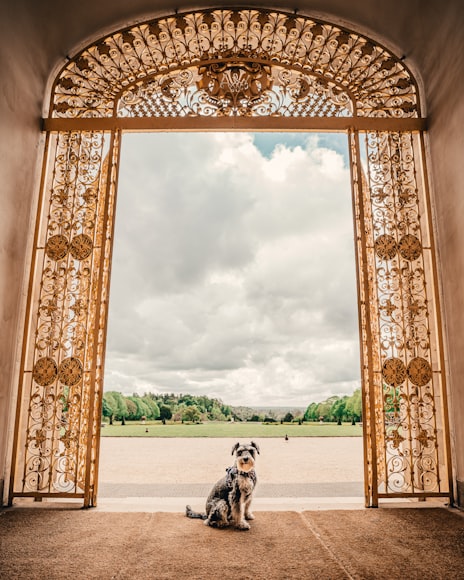
The Miniature Schnauzer, with its charming appearance and exceptional temperament, has rightfully earned its place as a beloved family pet. These intelligent, trainable, and affectionate dogs are the epitome of canine companionship.
Intelligence and Trainability
Miniature Schnauzers are highly intelligent dogs, renowned for their ability to learn quickly and follow commands. Their keen intelligence makes them easy to train, excelling in obedience, agility, and other canine sports. With patience and consistency, they can master a wide range of tricks and behaviors.
Loyalty and Affection
Loyalty is ingrained in the nature of Miniature Schnauzers. They form strong bonds with their owners and are fiercely protective of their family. These dogs are known to be affectionate and loving, showering their humans with cuddles and wagging tails. Their unwavering devotion makes them ideal companions for individuals and families alike.
Playfulness and Energy
Beneath their dignified appearance lies a playful and energetic spirit. Miniature Schnauzers are always ready for a game of fetch or a brisk walk. Their high energy levels require regular exercise and mental stimulation to keep them happy and healthy. They thrive in environments that offer opportunities for running, chasing, and exploring.
Other Notable Traits
In addition to their primary characteristics, Miniature Schnauzers possess several other noteworthy traits:
- Hypoallergenic: Their wire-like coat sheds minimally, making them a suitable breed for individuals with allergies.
- Watchdog Instinct: While not typically aggressive, Miniature Schnauzers have a strong watchdog instinct and will alert their owners to any potential danger.
- Independence: Miniature Schnauzers are independent thinkers, but they also crave attention and interaction with their humans.
- Grooming: Their double-layered coat requires regular brushing and occasional professional grooming to maintain its healthy appearance.
Health Concerns
Like all breeds, Miniature Schnauzers are prone to certain health conditions, including:
- Hip Dysplasia: A condition that affects the hip joints, causing pain and lameness.
- Eye Problems: Issues such as cataracts and glaucoma can occur later in life.
- Liver Disease: Liver disease, particularly chronic hepatitis, is another potential health concern.
Regular check-ups with a veterinarian can help detect and manage these conditions early on, promoting a long and healthy life for your Miniature Schnauzer.
Conclusion
The Miniature Schnauzer is an exceptional companion dog that combines intelligence, loyalty, playfulness, and affection. Their hypoallergenic coat, watchdog instinct, and independent nature make them suitable for a wide range of owners. With proper training, exercise, and care, these dogs will bring years of joy and companionship to their families. Whether you’re seeking a loyal lapdog or an energetic adventure buddy, the Miniature Schnauzer is a breed that will undoubtedly steal your heart.
Health and Care
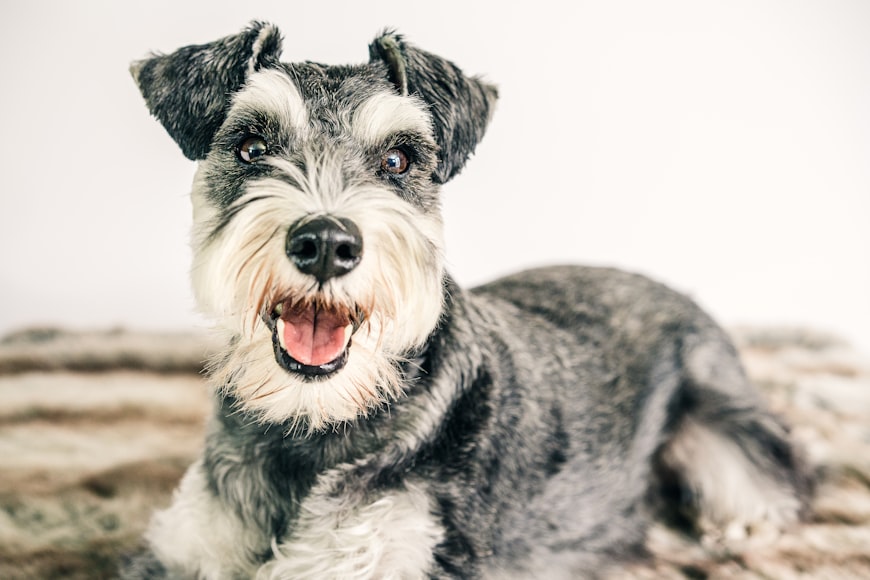
The Miniature Schnauzer, a beloved companion and energetic breed, is known for its distinctive salt-and-pepper coat and loyalty. This breed boasts a generally healthy disposition, with an average lifespan of 12-16 years. However, like all breeds, Miniature Schnauzers may be susceptible to certain health issues.
Common Health Issues
-
Cataracts: Cataracts are a clouding of the eye lens, which can lead to decreased vision and blindness. Early detection and treatment are crucial to preserve vision. Regular veterinary checkups and annual eye exams can help identify and manage cataracts effectively.
-
Urinary Stones: Urinary stones are crystal-like formations that can form in the bladder or kidneys. They can cause pain, discomfort, and urinary problems. A balanced diet, adequate water intake, and regular veterinary monitoring can help prevent and treat urinary stones.
Essential Grooming and Dental Care
Grooming:
-
Stripping or Clipping: Miniature Schnauzers require regular grooming to maintain their signature coat. Stripping, a technique that involves manually removing dead hair, is recommended for maintaining the traditional “schnauzer cut.” Alternatively, clipping can be performed to achieve shorter coat styles.
-
Bathing: Bathing frequency will vary depending on the dog’s activity level and lifestyle. A gentle shampoo designed for dogs is recommended. Avoid over-bathing, as it can strip the natural oils from the skin.
Dental Care:
-
Brushing: Regular teeth brushing with a dog-specific toothpaste is essential for preventing periodontal disease and maintaining oral hygiene. Brush your Miniature Schnauzer’s teeth at least twice a week, ideally daily.
-
Professional Cleaning: Professional dental cleaning performed by a veterinarian is recommended every 6-12 months to remove plaque and tartar and prevent gum disease.
Other Health Considerations
-
Exercise: Miniature Schnauzers are active and playful dogs that require regular exercise. Daily walks and opportunities for running and chasing can help maintain their physical and mental well-being.
-
Nutrition: A balanced and age-appropriate diet is crucial for maintaining a healthy weight and providing essential nutrients. Consult with a veterinarian or certified veterinary nutritionist to determine the best diet for your Miniature Schnauzer.
-
Vaccinations: Keep your Miniature Schnauzer up-to-date on vaccinations to protect against preventable diseases, such as distemper, parvovirus, and rabies.
Conclusion
The Miniature Schnauzer is a generally healthy breed with a long and fulfilling lifespan. By understanding potential health issues, following a comprehensive grooming and dental care routine, and providing a balanced diet, regular exercise, and preventative veterinary care, you can ensure that your Miniature Schnauzer companion enjoys a healthy and happy life. Remember to consult with your veterinarian for routine checkups, vaccinations, and any other health-related concerns.
Training and Exercise
Miniature Schnauzers are intelligent, energetic, and lovable dogs that make wonderful companions. However, like all dogs, they require proper training and exercise to live a healthy and happy life.
Training
Miniature Schnauzers are highly intelligent dogs that are eager to please. This makes them relatively easy to train, but it also means that they can be stubborn if they don’t understand what you want from them.
Start Training Early
It’s important to start training your Miniature Schnauzer puppy as soon as possible. Puppies are more receptive to training than adult dogs, and they will learn faster if you start training them when they are young.
Use Positive Reinforcement
Positive reinforcement is the best way to train a Miniature Schnauzer. This means rewarding your dog with treats, praise, or play whenever they do something you like. Avoid using punishment, as this can make your dog fearful or aggressive.
Be Consistent
Consistency is key when training your Miniature Schnauzer. Use the same commands and rewards every time, and be patient if your dog doesn’t get it right away.
Common Training Commands
Some of the most important training commands for Miniature Schnauzers include:
- Sit
- Stay
- Come
- Heel
- Down
- Leave it
- Drop it
Socialization
Socialization is also important for Miniature Schnauzers. This means exposing your dog to a variety of people, places, and experiences. Socialization helps your dog learn how to behave properly around others, and it can also help prevent them from developing fear or aggression.
Start Socializing Early
Start socializing your Miniature Schnauzer puppy as soon as possible. Take them to puppy classes, dog parks, and other places where they can interact with other people and animals.
Be Patient
Socialization can take time, so be patient with your dog. Don’t force them into situations that they’re not comfortable with, and always reward them for good behavior.
Exercise
Miniature Schnauzers are active dogs that need daily exercise. This can include walks, playtime, or runs. Exercise helps keep your dog healthy and happy, and it can also help prevent them from developing behavioral problems.
How Much Exercise?
Most Miniature Schnauzers need at least 30 minutes of exercise per day. However, some dogs may need more or less exercise depending on their age, health, and activity level.
Types of Exercise
There are many different types of exercise that you can do with your Miniature Schnauzer. Some popular options include:
- Walking
- Running
- Playing fetch
- Swimming
- Agility training
Find an Activity Your Dog Enjoys
The best way to ensure that your Miniature Schnauzer gets enough exercise is to find an activity that they enjoy. This will make exercise more fun for both of you, and it will help your dog stay motivated.
Health Benefits of Exercise
Exercise provides many health benefits for Miniature Schnauzers, including:
- Helps maintain a healthy weight
- Reduces the risk of heart disease, diabetes, and other health problems
- Improves joint health
- Strengthens muscles
- Boosts energy levels
- Reduces stress and anxiety
Behavioral Benefits of Exercise
Exercise can also help improve your Miniature Schnauzer’s behavior. Exercise helps tire out your dog, which can reduce boredom and destructive behavior. It can also help improve your dog’s socialization skills and make them more confident.
Conclusion
Training and exercise are essential for Miniature Schnauzers. Proper training can help your dog learn how to behave properly, and exercise can help keep your dog healthy and happy. By following the tips in this guide, you can help your Miniature Schnauzer live a long, healthy, and happy life.
Nutrition
Miniature Schnauzers, with their distinctive salt-and-pepper coats and endearing personalities, are beloved companions that deserve the highest quality nutrition to thrive and live long, healthy lives. As a pet blogger specializing in this breed, I’m here to guide you through the essential elements of a tailored nutritional plan.
High-Quality Diet: The Foundation of Well-being
Just like humans, Miniature Schnauzers have specific dietary requirements that must be met to support their optimal health. Opting for high-quality, premium pet food is paramount. These formulations are meticulously designed to provide a balanced blend of essential nutrients, including:
- Protein: A vital nutrient for building and repairing tissues, maintaining muscle mass, and supporting a strong immune system.
- Fat: Provides energy, supports cell function, and enhances the absorption of fat-soluble vitamins.
Tailoring to Specific Needs
While premium pet food offers a solid foundation, it’s essential to consider your Schnauzer’s unique needs when selecting a diet. Factors such as age, activity level, and any health conditions should be taken into account.
- Puppies: Growing puppies require a diet higher in protein and calories to support their rapidly developing bodies.
- Adults: Adult Schnauzers need a high-quality diet that maintains their weight and energy levels.
- Senior Schnauzers: Senior dogs may have reduced energy requirements, so a diet tailored to their decreased activity level is crucial.
- Dogs with Health Conditions: Schnauzers with specific health conditions, such as allergies or digestive issues, may require a specialized diet recommended by a veterinarian.
Meeting Protein and Fat Requirements
Protein and fat are the cornerstones of a Miniature Schnauzer’s diet. Ensure adequate intake by choosing a food that provides:
- Protein: Aim for a protein content of at least 25-30% for puppies and adult Schnauzers, and slightly lower for senior dogs.
- Fat: The optimal fat content for Miniature Schnauzers is around 15-20%. Fat provides energy and supports skin and coat health.
Other Nutritional Considerations
In addition to protein and fat, your Miniature Schnauzer’s diet should include a balance of carbohydrates, fiber, vitamins, and minerals.
- Carbohydrates: Provide energy and help regulate blood sugar levels. Opt for complex carbohydrates, such as brown rice or oatmeal, over simple carbohydrates like corn syrup.
- Fiber: Supports digestive health and provides a feeling of fullness. Look for a diet that includes moderate levels of soluble and insoluble fiber.
- Vitamins and Minerals: Essential for overall health and well-being. A high-quality pet food should provide all the essential vitamins and minerals your Schnauzer needs.
Avoiding Dietary Pitfalls
While there are many nutritious options available, you should avoid certain ingredients in your Miniature Schnauzer’s diet that can be harmful or allergenic:
- Low-Quality Ingredients: Steer clear of foods that contain fillers, such as corn, wheat, or soy, which can lead to digestive issues and nutritional deficiencies.
- Artificial Colors and Flavors: These additives have no nutritional value and can potentially cause allergies or other health problems.
- Excessive Table Scraps: While occasional treats are fine, a diet consisting mainly of human food can lead to weight gain, pancreatitis, and other health concerns.
Conclusion
Providing your Miniature Schnauzer with a high-quality diet tailored to their specific needs is crucial for their long-term health and happiness. By carefully selecting a diet that meets their protein and fat requirements, as well as other essential nutrients, you can ensure a thriving companion for many years to come. Remember to consult with your veterinarian for personalized recommendations and to monitor your Schnauzer’s weight and overall health regularly. By following these guidelines, you can nurture your furry friend with exceptional nutrition, maximizing their well-being and creating an unbreakable bond.
Companionship and Family Life
The Miniature Schnauzer, a charming and versatile breed, is renowned for its exceptional companionship qualities and adaptability to various lifestyles. Whether you reside in a cozy apartment or a spacious house with a yard, this loyal and affectionate dog will make an invaluable addition to your family. Their intelligence, loyalty, and playful nature make them ideal companions for individuals and families of all ages.
Devoted Companions for Individuals:
Miniature Schnauzers are highly devoted and affectionate dogs that thrive on human companionship. They form strong bonds with their owners and are known for their playful and affectionate demeanor. Whether you’re enjoying a quiet evening at home or engaging in outdoor adventures, your Miniature Schnauzer will be your constant companion and loyal sidekick. Their unwavering loyalty and willingness to please make them exceptional emotional support animals, providing comfort and companionship to individuals of all ages.
Exceptional Family Dogs:
Miniature Schnauzers are wonderful companions for families with children. Their playful and gentle nature makes them great playmates for kids, and their intelligence and eagerness to learn allow them to adapt well to household rules. They are patient and tolerant with children, making them ideal companions for growing families. Moreover, their protective instincts make them excellent watchdogs, alerting their family to any potential danger.
Adaptable to Different Environments:
Miniature Schnauzers are highly adaptable dogs that can thrive in various living environments. Their compact size makes them well-suited for apartments or smaller homes, where they can get plenty of exercise through indoor play or short walks. However, they also enjoy having access to a fenced yard where they can run and play. Their adaptability and ease of care make them great companions for those living in both urban and suburban areas.
Loyal and Protective Watchdogs:
Despite their diminutive size, Miniature Schnauzers are excellent watchdogs. They are naturally alert and protective of their family, and their keen senses allow them to detect potential threats. While they are not known for being overly aggressive, their unwavering loyalty and willingness to defend their loved ones make them effective deterrents against intruders. They will bark to alert their family to any suspicious noises or activity, providing peace of mind and a sense of security.
Easy to Care For:
Miniature Schnauzers are relatively easy to care for and maintain. Their wiry coat requires regular brushing and occasional trimming, but they do not shed excessively. They are also generally healthy and robust dogs that are not prone to major health issues. With proper nutrition, exercise, and veterinary care, Miniature Schnauzers can live long, happy, and healthy lives.
In conclusion, Miniature Schnauzer dogs are exceptional companions for individuals and families alike. Their devoted and affectionate nature, adaptability to various living environments, and protective instincts make them ideal choices for those seeking a loyal, loving, and playful companion. Whether you live in a vibrant city or a peaceful suburb, a Miniature Schnauzer will bring joy, laughter, and unwavering companionship into your life.
Breed Variations
The Miniature Schnauzer, an endearing and charming canine companion, comes in three distinct sizes, each boasting its own unique characteristics. From the petite Miniature to the towering Giant, these variations celebrate the breed’s adaptability and versatility.
The Miniature Schnauzer: A Compact Companion
The Miniature Schnauzer, the smallest of the trio, is a beloved choice for families and individuals seeking a loyal and affectionate pet. These dogs typically weigh between 11 and 16 pounds, making them ideal for apartment or city living. Their compact size belies a sturdy and well-proportioned frame, with a distinctive salt-and-pepper coat that is hypoallergenic and relatively low-maintenance.
Despite their diminutive stature, Miniature Schnauzers are feisty and energetic dogs with a playful spirit. They are highly intelligent and eager to learn, making them excellent candidates for obedience training. Their protective nature makes them loyal companions and alert watchdogs.
The Standard Schnauzer: A Moderate Middle Ground
The Standard Schnauzer embodies a balance between the compact Miniature and the colossal Giant. Weighing around 30-45 pounds, these dogs possess a rugged and muscular build suitable for a multitude of activities. Their wiry, weather-resistant coat comes in a variety of colors, including black, silver, and salt-and-pepper.
Standard Schnauzers are known for their intelligence, athleticism, and versatility. They excel in agility, obedience, and tracking disciplines. Their loyalty, protective instinct, and playful nature make them ideal family dogs.
The Giant Schnauzer: A Majestic Guardian
The Giant Schnauzer stands tall as the largest variety of the breed, weighing over 60 pounds. These impressive dogs exude an aura of power and strength. Their dense, wiry coat is usually black, providing insulation against extreme temperatures.
Giant Schnauzers are known for their exceptional intelligence, loyalty, and protectiveness. They make formidable guardians and excel in tasks requiring strength and agility. Their calm and dignified demeanor makes them ideal companions for active families and individuals.
Differences Beyond Size
While size is the most apparent difference between these breed variations, they also exhibit subtle variations in temperament and energy levels. Miniature Schnauzers tend to be more playful and energetic, while Standard and Giant Schnauzers are typically more dignified and calm.
Choosing the Right Variety
The choice of breed variation ultimately depends on individual preferences and lifestyle. Miniature Schnauzers are well-suited for apartment living and families with young children. Standard Schnauzers are ideal for active families and those seeking a versatile companion. Giant Schnauzers are recommended for individuals or families with ample space and experience with large breeds.
Conclusion
The Miniature Schnauzer breed offers a diverse range of companions, each with its own unique charm and capabilities. From the spirited Miniature to the majestic Giant, these breed variations celebrate the versatility and adaptability of this beloved canine. By understanding the distinct characteristics of each variety, prospective owners can choose the perfect furry friend to complement their lifestyle and personality.
Pros and Cons
The adorable Miniature Schnauzer, with its distinctive wiry coat and bushy eyebrows, has captured the hearts of countless dog lovers worldwide. However, every breed has its unique advantages and challenges, and the Miniature Schnauzer is no exception. Let’s delve into the pros and cons of owning this beloved companion.
Pros:
1. Intelligence: Miniature Schnauzers are renowned for their sharp minds and quick-learning abilities. They excel in obedience training, agility courses, and even have a knack for learning tricks. Their intelligence makes them highly trainable and eager to please their owners.
2. Affectionate and Loyal: These dogs are fiercely loyal and affectionate with their families. They crave attention and love spending time in the company of their loved ones. Schnauzers form strong bonds with their owners and are always ready to cuddle or play.
3. Low-Shedding: Miniature Schnauzers have a wiry, hypoallergenic coat that sheds minimally. This makes them an excellent choice for people with allergies or those who prefer a low-maintenance dog. Regular brushing and professional grooming sessions are still necessary to maintain their distinctive look.
4. Family-Friendly: Schnauzers are generally good-natured with children and other pets. Their playful nature makes them excellent companions for active families. However, early socialization and training are essential to ensure a well-rounded and well-behaved dog.
5. Moderate Exercise Requirements: While Miniature Schnauzers enjoy daily walks and playtime, they do not require excessive exercise. They are adaptable to various living situations, making them suitable for both apartment dwellers and homeowners.
Cons:
1. Potential Health Issues: Miniature Schnauzers can be prone to certain health conditions, including pancreatitis, liver disease, and urinary tract infections. Regular veterinary check-ups and a healthy diet are crucial for maintaining their well-being.
2. Grooming Requirements: As mentioned earlier, Schnauzers require regular grooming to maintain their characteristic coat. Stripping or hand-stripping the coat every 4-6 weeks is essential to remove dead hair and keep it healthy. Additionally, they need regular brushing and bathing.
3. Barking Tendency: Miniature Schnauzers are known for their vocal nature and may bark excessively at strangers, noises, or anything that they perceive as a threat. Proper training and socialization from a young age can help mitigate this behavior.
4. Stubbornness: While intelligent, Schnauzers can also be quite stubborn at times. They may not always be the most obedient dogs and require consistent training and positive reinforcement to learn commands.
5. Separation Anxiety: Miniature Schnauzers can experience separation anxiety if left alone for extended periods. They thrive on companionship and may suffer from stress or behavioral problems if not given enough attention.
Conclusion:
The Miniature Schnauzer is a charming and intelligent breed that can bring joy and companionship to families. However, it’s important to consider both the pros and cons before bringing one of these adorable dogs into your home. With proper care, training, and attention, a Miniature Schnauzer can be a loyal and rewarding addition to your life.
If you are prepared to handle the potential health issues, grooming requirements, and barking tendency, then a Miniature Schnauzer may be the perfect match for you. Remember, owning a dog is a lifelong commitment, and it’s crucial to be well-informed about the breed’s characteristics and needs before making a decision.

















